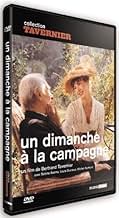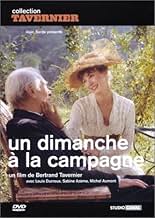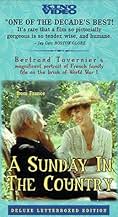Un dimanche à la campagne
- 1984
- Tous publics
- 1h 30min
NOTE IMDb
7,4/10
3,4 k
MA NOTE
Un peintre âgé que son fils visite avec sa famille le week-end est aussi surpris par la visite de sa fille toujours célibataire.Un peintre âgé que son fils visite avec sa famille le week-end est aussi surpris par la visite de sa fille toujours célibataire.Un peintre âgé que son fils visite avec sa famille le week-end est aussi surpris par la visite de sa fille toujours célibataire.
- Réalisation
- Scénario
- Casting principal
- Nomination aux 1 BAFTA Award
- 13 victoires et 12 nominations au total
Sabine Azéma
- Irène
- (as Sabine Azema)
Geneviève Mnich
- Marie-Thérèse
- (as Genevieve Mnich)
Avis à la une
I saw this film as a gift. For images, reminding the work of an Auguste Renoir, for portrait of family and the small gestures defining the relations between its members, for lovely acting and for the good state of soul inspired by it.
I discovered it, in same measure, as a beautiful gift offered by Bertrand Tavernier. A precious gift about meaning of life and meanings of visits, about the games of children and problems of adults, about joy and the shadows of sadness, about a venerable manner and the lady helping him in ordinary problems.
Nostalgia ? Off course, but it represents more and , scene by scene, you feel it.
A beautiful film as a precious circle of emotions.
I discovered it, in same measure, as a beautiful gift offered by Bertrand Tavernier. A precious gift about meaning of life and meanings of visits, about the games of children and problems of adults, about joy and the shadows of sadness, about a venerable manner and the lady helping him in ordinary problems.
Nostalgia ? Off course, but it represents more and , scene by scene, you feel it.
A beautiful film as a precious circle of emotions.
Not much happens during "A Sunday in the Country", which depicts what the title suggests: a well-to-do French family having a Sunday gathering during what appears to be the 1920s - it is the world of Marcel Proust, only a few decades later. This presents more of a family portrait and character revelation piece than a plotted story. We get to know the main characters and their relationships - the genteel old father dotes on his exciting daughter and is critical of his dour, proper son. He is dependent on the crabby housekeeper who rules the home. It is a mellow, fine-looking film, sprinkled with comments on impending death and art. Sabine Azema steals the show as the charming but flaky Irene.
I think this film can be appreciated on several levels. For some viewers, this is just a happy family portrait, reflecting a more peaceful time and recalling one's own memories of family outings and quiet Sunday afternoons. I think this point of view is mistaken, but I can see why people feel this way. The film is externally slow- moving and peaceful, like a sunny river. But like a river, there are strong currents lurking, invisible, under the surface -- currents that cannot be seen, but only observed indirectly from their effects.
There's a lot more going on here than just ninety minutes of bucolic peacefulness. Pay attention to the details, the small looks and gestures, the things said and things left unsaid. You can almost see the fine strands that link the characters, like a spiderweb, where each character's movements are felt by all the others. The role of the narrator, often disparaged in film, is used effectively here, giving the film a somewhat novel-like quality and reminding the viewer of their presence as an observer.
There's more to be said about this film, but I don't feel quite up to it. In any case, the real meaning of the film can't easily be described in words -- which is a good thing, or the film would be unnecessary. So watch the film yourself, if you haven't already, and see what you think.
There's a lot more going on here than just ninety minutes of bucolic peacefulness. Pay attention to the details, the small looks and gestures, the things said and things left unsaid. You can almost see the fine strands that link the characters, like a spiderweb, where each character's movements are felt by all the others. The role of the narrator, often disparaged in film, is used effectively here, giving the film a somewhat novel-like quality and reminding the viewer of their presence as an observer.
There's more to be said about this film, but I don't feel quite up to it. In any case, the real meaning of the film can't easily be described in words -- which is a good thing, or the film would be unnecessary. So watch the film yourself, if you haven't already, and see what you think.
I saw this film many years ago and loved it and just rewatched it again, this time, on DVD with Bertrand Tavernier's commentary. I must say that I love it now even more. The two words that permeate throughout his film rhythm and time. It is strange to me that he does not say that impressionism was a major inspiration in the work, in fact he says the contrary. Yet I've noticed many films where the director meant to do something only it was taken very differently by the viewers and I guess this was such a case.
Anyway to get back to the film, in hearing Tavernier's commentary, I now realize how musical the whole film is, it's lazy, Sunday tone, then Irene (Azema) coming in like a tornado, then quiet conversations, then someone getting stuck in a tree, then another quiet conversation, then a dance...a series of stop starts that lulls you in its rhythm, but awakens you again with bursts of life and vitality.
In speaking of time and the passage of it, Tavernier encapsulates the life of Mr. Lamiral in one Sunday afternoon, and all the bittersweet sadness, through his relationship with his children, grandchildren, maid and himself through his actions and voiceovers made by an all knowing narrator.
I feel a sense of pride that Tavernier points out in his commentary the poignant scenes which I was so touched by in the first viewing. The scene where Irene tells herself that her niece would die young, the scene where Irene and her father speak of painting, The narrator supplying profound insights on M. Ladmiral about his indifference to his grandchildren. Gonzague's and his wife's decency, but utter clumsiness, living a life bounded by convention and security.
I also learned so much about camera movement through Tavernier. He describes not only the how, but why certain shots are shot they are and you begin to understand why certain scenes provoke certain emotions not only through dialogue and setting, but also how you hear something and see something. One scene where Gonzague and his wife are having an argument and M. Ladmiral comes into the scene but rather than say a word to interrupt, he concludes to himself that it is pointless and leaves the scene without uttering a word. Such a scene tells so much, the relationship of the couple, the father's relationship with the couple, and the father's relationship with himself, all in the frame of a 5 second shot. I'm grateful to M. Tavernier for having created such a beautiful film and added such brilliant insight on the nature of this work.
Anyway to get back to the film, in hearing Tavernier's commentary, I now realize how musical the whole film is, it's lazy, Sunday tone, then Irene (Azema) coming in like a tornado, then quiet conversations, then someone getting stuck in a tree, then another quiet conversation, then a dance...a series of stop starts that lulls you in its rhythm, but awakens you again with bursts of life and vitality.
In speaking of time and the passage of it, Tavernier encapsulates the life of Mr. Lamiral in one Sunday afternoon, and all the bittersweet sadness, through his relationship with his children, grandchildren, maid and himself through his actions and voiceovers made by an all knowing narrator.
I feel a sense of pride that Tavernier points out in his commentary the poignant scenes which I was so touched by in the first viewing. The scene where Irene tells herself that her niece would die young, the scene where Irene and her father speak of painting, The narrator supplying profound insights on M. Ladmiral about his indifference to his grandchildren. Gonzague's and his wife's decency, but utter clumsiness, living a life bounded by convention and security.
I also learned so much about camera movement through Tavernier. He describes not only the how, but why certain shots are shot they are and you begin to understand why certain scenes provoke certain emotions not only through dialogue and setting, but also how you hear something and see something. One scene where Gonzague and his wife are having an argument and M. Ladmiral comes into the scene but rather than say a word to interrupt, he concludes to himself that it is pointless and leaves the scene without uttering a word. Such a scene tells so much, the relationship of the couple, the father's relationship with the couple, and the father's relationship with himself, all in the frame of a 5 second shot. I'm grateful to M. Tavernier for having created such a beautiful film and added such brilliant insight on the nature of this work.
I saw this film sixteen years ago, at a time when I did not see many 'filmhouse' movies yet. It made a strong impression on me, I wasn't used to so many 'open spaces' in films, which spectators have to fill according to their own ideas. Later I understood that once you start filling these 'holes' with pieces of yourself, the film becomes much more personal.
From time to time I think back to this film, like I did just now when I looked it up in the IMDB. Its storytelling, or rather story-hinting, is apparently so strong that even after sixteen years I am looking for some answers to the questions that the film raises.
In short: go see it.
From time to time I think back to this film, like I did just now when I looked it up in the IMDB. Its storytelling, or rather story-hinting, is apparently so strong that even after sixteen years I am looking for some answers to the questions that the film raises.
In short: go see it.
Le saviez-vous
- AnecdotesThe film is included on Roger Ebert's "Great Movies" list.
- GaffesIrene's flower in her bodice disappears and then reappears.
- Bandes originalesQuintette pour piano et cordes Op. 115
Written by Gabriel Fauré
Performed by Le quatuor Via Nova, Jean Hubeau piano solo
Meilleurs choix
Connectez-vous pour évaluer et suivre la liste de favoris afin de recevoir des recommandations personnalisées
- How long is A Sunday in the Country?Alimenté par Alexa
Détails
- Date de sortie
- Pays d’origine
- Langue
- Aussi connu sous le nom de
- A Sunday in the Country
- Lieux de tournage
- Château du Grand Saint-Léger, Villers-en Arthies, Val-d'Oise, France(house and garden)
- Sociétés de production
- Voir plus de crédits d'entreprise sur IMDbPro
Box-office
- Montant brut aux États-Unis et au Canada
- 2 411 143 $US
- Montant brut mondial
- 2 411 143 $US
Contribuer à cette page
Suggérer une modification ou ajouter du contenu manquant


























